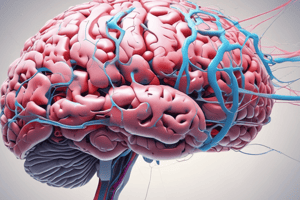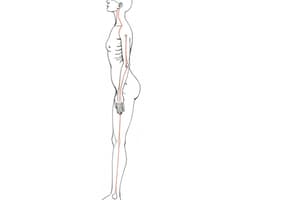Podcast
Questions and Answers
What role does the optokinetic system play in relation to the vestibular system?
What role does the optokinetic system play in relation to the vestibular system?
- It completely replaces the vestibular system during motion.
- It works independently without any influence from the vestibular system.
- It functions only during rapid head movements.
- It supplements the vestibular system during sustained rotations. (correct)
What induces movement in the endolymph of the horizontal semicircular canal?
What induces movement in the endolymph of the horizontal semicircular canal?
- Rapid movements of the upper body.
- Movement of the eyes in response to a visual stimulus.
- Caloric stimulation of the external auditory meatus. (correct)
- A lateral head turn toward the left. (correct)
Which structure inhibits the ipsilateral abducens nucleus during the optokinetic response?
Which structure inhibits the ipsilateral abducens nucleus during the optokinetic response?
- The vestibular nuclei. (correct)
- The contralateral lateral rectus muscle.
- The abducens nerve.
- The medial longitudinal fasciculus.
What does the absence of slow and quick phases of eye movement indicate during the OKN test?
What does the absence of slow and quick phases of eye movement indicate during the OKN test?
What is the primary function of the abducens nucleus?
What is the primary function of the abducens nucleus?
How is the optokinetic response provoked?
How is the optokinetic response provoked?
What is a bedside test that evaluates foveal pursuit and refixation saccades?
What is a bedside test that evaluates foveal pursuit and refixation saccades?
What is the role of the medial longitudinal fasciculus (MLF) in eye movement?
What is the role of the medial longitudinal fasciculus (MLF) in eye movement?
Which structure provides an excitatory input to the ipsilateral abducens nucleus for saccades?
Which structure provides an excitatory input to the ipsilateral abducens nucleus for saccades?
What type of eye movement characterizes true optokinetic nystagmus (OKN)?
What type of eye movement characterizes true optokinetic nystagmus (OKN)?
What is the primary function of vergence movements?
What is the primary function of vergence movements?
Which statement about divergence is correct?
Which statement about divergence is correct?
What role do the otoliths (utricle and saccule) play in eye movements?
What role do the otoliths (utricle and saccule) play in eye movements?
Which type of eye movement is essential for binocular single vision?
Which type of eye movement is essential for binocular single vision?
How does the vestibular system contribute to eye movements?
How does the vestibular system contribute to eye movements?
What is a characteristic of active eye movements like vergence?
What is a characteristic of active eye movements like vergence?
Which statement is true about ocular counter-rolling?
Which statement is true about ocular counter-rolling?
What is the relationship between vergence movements and binocular fusion?
What is the relationship between vergence movements and binocular fusion?
What indicates a possible restrictive limitation in eye movement?
What indicates a possible restrictive limitation in eye movement?
What is the term for the deviation of the nonfixating paretic eye in paralytic strabismus?
What is the term for the deviation of the nonfixating paretic eye in paralytic strabismus?
What condition is more likely to develop amblyopia?
What condition is more likely to develop amblyopia?
What should be tested to determine if a conjugate defect has reflexive eye movement?
What should be tested to determine if a conjugate defect has reflexive eye movement?
What type of diplopia is associated with a patient experiencing esotropia?
What type of diplopia is associated with a patient experiencing esotropia?
What phenomenon may occur with eye closure in patients experiencing gaze palsy?
What phenomenon may occur with eye closure in patients experiencing gaze palsy?
Which condition is characterized by a patient learning to suppress the false image?
Which condition is characterized by a patient learning to suppress the false image?
What visual complication can arise from persistent gaze palsies?
What visual complication can arise from persistent gaze palsies?
What assessment should be performed to evaluate the range of motion monocularly?
What assessment should be performed to evaluate the range of motion monocularly?
Which condition is commonly associated with esotropia during recovery due to abducens palsy?
Which condition is commonly associated with esotropia during recovery due to abducens palsy?
Which of the following is listed as a common cause of vertical diplopia?
Which of the following is listed as a common cause of vertical diplopia?
What is the primary deviation when fixating with the nonparetic eye in incomitant strabismus?
What is the primary deviation when fixating with the nonparetic eye in incomitant strabismus?
Which of the following is identified as a less common cause of vertical diplopia?
Which of the following is identified as a less common cause of vertical diplopia?
Which cause of esotropia is directly related to an increase in convergence tone due to cerebellar dysfunction?
Which cause of esotropia is directly related to an increase in convergence tone due to cerebellar dysfunction?
Which condition is characterized by the presence of a spastic phase in cyclic oculomotor palsy?
Which condition is characterized by the presence of a spastic phase in cyclic oculomotor palsy?
Which syndrome is described as having an associated abduction deficit and hypometric saccades?
Which syndrome is described as having an associated abduction deficit and hypometric saccades?
Which type of eye movement disorder is linked to orbital infiltration or lymphomas?
Which type of eye movement disorder is linked to orbital infiltration or lymphomas?
What condition is associated with a risk of double elevator palsy?
What condition is associated with a risk of double elevator palsy?
What primarily rotates the eyes directly upward?
What primarily rotates the eyes directly upward?
What is the maximum angle of esotropia that is typically expected to resolve without surgery?
What is the maximum angle of esotropia that is typically expected to resolve without surgery?
At what age is early correction of strabismus shown to improve visual cortical development?
At what age is early correction of strabismus shown to improve visual cortical development?
Which muscle action primarily causes excyclotorsion of the affected eye in the event of a superior oblique palsy?
Which muscle action primarily causes excyclotorsion of the affected eye in the event of a superior oblique palsy?
What is the typical degree of incyclotorsion caused by the superior oblique muscle?
What is the typical degree of incyclotorsion caused by the superior oblique muscle?
What condition is often associated with constant esotropia after 3 months of age?
What condition is often associated with constant esotropia after 3 months of age?
Which treatment option is common for managing intermittent exotropia?
Which treatment option is common for managing intermittent exotropia?
What type of deviation can ocular torsion help differentiate?
What type of deviation can ocular torsion help differentiate?
Which muscle assists the inferior rectus in rotating the eyes directly downward?
Which muscle assists the inferior rectus in rotating the eyes directly downward?
Flashcards are hidden until you start studying
Study Notes
Optokinetic System and Vestibular System
- The optokinetic system supplements the vestibular system during sustained rotations.
- OKN (optokinetic nystagmus) is characterized by rhythmic involuntary conjugate eye oscillation.
- A lateral head turn induces movement in the endolymph of the horizontal semicircular canal, exciting the contralateral abducens nucleus while inhibiting the ipsilateral abducens nucleus.
Elicitation of OKN
- Movement can be provoked by dynamic visual stimuli, such as a rotating image of the environment.
- Bedside tests for OKN evaluate foveal pursuit and refixation saccades, requiring the subject to simply look at the stimulus without tracking its motion.
- Slow and quick phases of eye movement are assessed in response to stimulus motion.
Vergence Movements
- Vergence movements (convergence and divergence) maintain ocular alignment for binocular vision on approaching or retreating objects.
- Electromyography shows divergence is an active movement, though less dynamic than convergence.
- The vestibular system stabilizes gaze during head movements by modifying tonic input to ocular motor nuclei.
Ocular Misalignment Evaluation
- Examine for abnormal resting head turns or tilts and assess ranges of versions and ductions to identify ocular misalignment.
- Ductions refer to monocular eye movement ranges; restrictive limitations may require forced eye movement testing.
- Conjugate defects, like gaze palsy, need to be evaluated for reflexive eye movements.
Amblyopia and Visual Impairments
- Suppression of a false image in cases of strabismus can lead to developmental amblyopia if it occurs before visual maturity.
- Esotropia is more likely to result in amblyopia than exotropia due to fixation challenges.
Causes of Esotropia
- Includes conditions like abducens palsy, accommodative esotropia, and congenital forms among others.
- Additional factors may include myasthenia gravis and various ocular muscle restrictions due to orbital issues.
Causes of Vertical Diplopia
- Common causes include superior oblique palsy and thyroid eye disease.
- Other less frequent causes involve orbital inflammation, myasthenia gravis, and structural abnormalities due to various syndromes or conditions.
Strabismus and Treatment
- Primary deviation refers to the angle of misalignment when fixating with the nonparetic eye.
- Correcting strabismus before 11 months improves visual cortical development, while constant esotropia after 3 months often signals underlying developmental issues.
- Treatment strategies for intermittent exotropia can include exercises, spectacles, or surgical interventions.
Studying That Suits You
Use AI to generate personalized quizzes and flashcards to suit your learning preferences.



